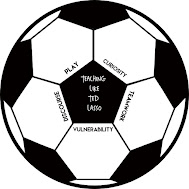Yes, people might be talking about you, especially if you attend our live episode of the #TeachingLikeTedLasso podcast at GVSU's Math in Action Conference on February 25, 2023.
Here's the description of the live session:
We started the Teaching Like Ted Lasso Podcast because we BELIEVE in the rich connections we saw between teaching and the positive and popular Apple TV show. No knowledge of the show is required - just an interest in improving our teaching! CURIOUS? Then please join us for this live episode, where you are the special guests sharing what works for you.
Even if you are not going to be in the Grand Rapids, Michigan area on the 25th of February, there are a couple of ways you can still participate.
Our session, like many others during the Math in Action Conference will be in a hybrid format. (The Conversations Among Colleagues Conference, focusing on teaching math, math education, and statistics in higher education, is taking place at the same time and also has hybrid session - two conferences for the price of one. You can see the schedules here and here.) That means you can Zoom in from anywhere in the world to participate and share your ideas.
Or, if you are busy that day, make a short (five minutes or less) video recording of your answers to the following questions and send them to us at teachingliketedlasso@gmail.com:
- Who are you?
- Where are you from?
- What is your relationship to education? and
- How do you apply [play, curiosity, teamwork, vulnerability, or discourse] in your teaching practice?


















